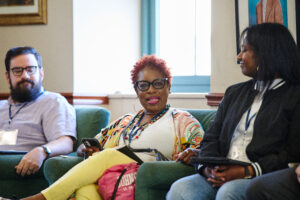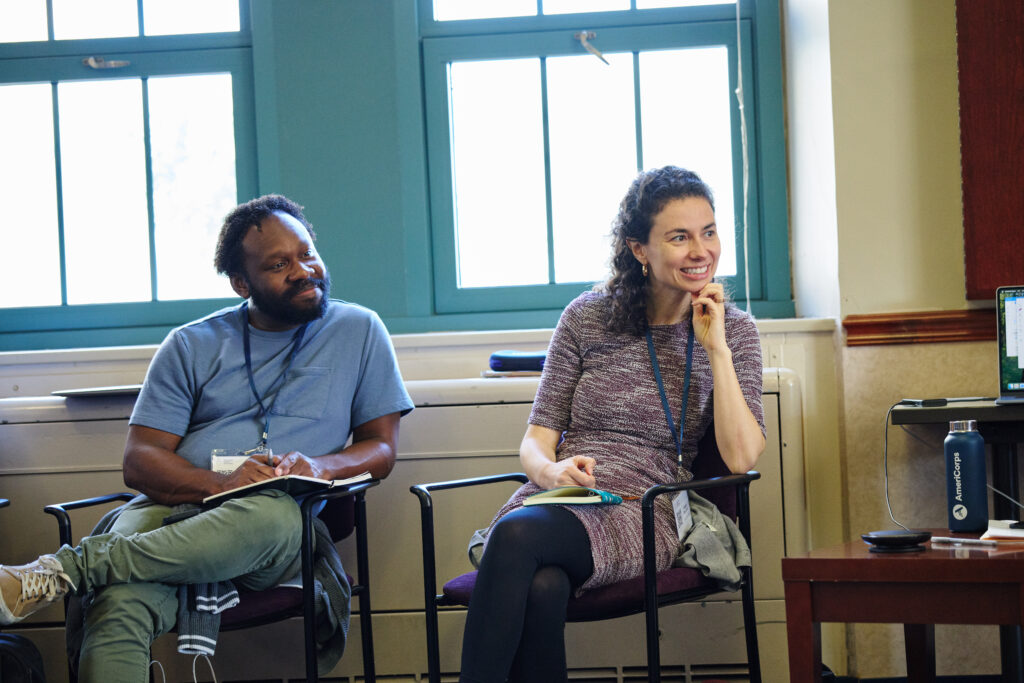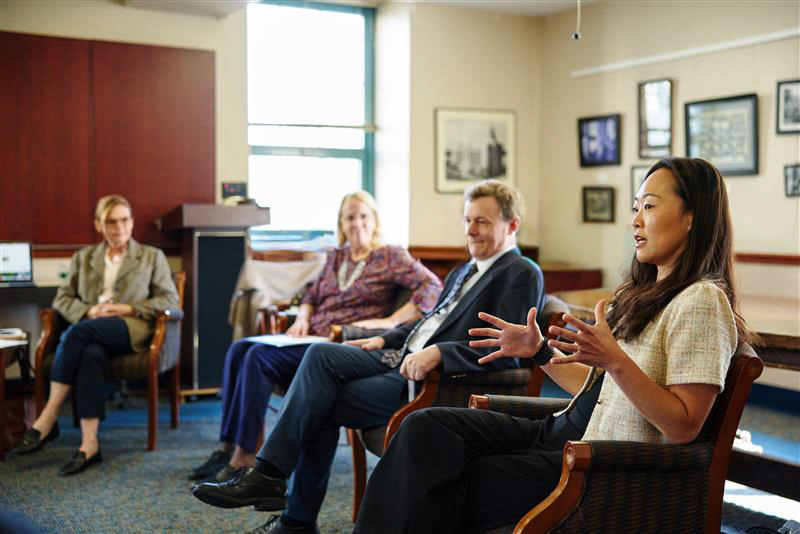True to its tagline, “Embracing Traditions, Engaging New Ideas,” the Lilly Endowment has awarded a $1.25 million grant in support of spiritual leaders navigating the emerging “phygital” (physical + digital) landscape. As part of this initiative, Just Horizons partnered with Wesleyan Impact Partners (WIP) to host a day-long learning experience at Boston University’s School of Theology and Center for Computing and Data Science for the Lilly initiative’s 19 Phygital Fellows.
Board Chair Suzanne Woolston Bossert welcomed the Phygital Fellows with gratitude for the innovative ways they’re “ministering to the spiritual needs of these extraordinary times through a combination of ancient wisdom and emerging technologies.” Many of the Fellows host platforms, podcasts, and online communities exploring faith in the digital age.
The Just Horizons convening was part of a four-day series these spiritual innovators from across the United States participated in, guided by Derrick Scott III, Associate Director of Learning and Innovation at WIP, and Angie Thurston, Cofounder and Executive Director of Sacred Design Lab (SDL).
The Fellows’ day with Just Horizons began with a panel discussion exploring the intersection of ethics, technology, and the human spirit featuring Executive Director Janet Kang, Chief Scientist Wesley Wildman, and Board Chair Suzanne Woolston Bossert.
As a tech entrepreneur committed to finding solutions to endemic problems, Kang reflected on a question she had raised in a previous Just Horizons roundtable: How do we get systems to love?
“If love can be understood as unconditional, it inevitably leads to a universal embrace of human dignity,” Kang observed. “But systems are about scalability, which requires prioritization that can seem at odds with unconditional love. The key is breaking down human dignity into behaviors and actions that can form systems based on respect for all of life.”

Balancing dual roles of philosopher and data scientist, Wildman emphasized Boston Personalism, a school of thought advanced by Howard Thurman and Martin Luther King Jr. that’s grounded in the sacred value of every human being. This philosophy shapes Wildman’s approach to “human factors,” which have been central to his teaching and research for more than 30 years at Boston University, and for nearly 20 years at the Center for Mind and Culture, an independent research lab under the Just Horizons umbrella.
Wildman shed light on the breakthrough discoveries of human factors computing:
“In my experience, the same principles Thurman and King championed apply when you’re in front of a body of computer code creating systems capable of supporting values. Of course, values don’t work the same way in computers as they do in human beings, but you can build up values that express the intention to treat people well—to recognize their sacredness—essentially importing the concepts of personalism into computational systems.”
The significance of bringing together values and technology resonated deeply in a room full of Fellows selected for their leading-edge work in digital ministry. Bossert, an alumna of BU School of Theology whose ministerial call led her into the digital arena two decades ago, offered this reflection:
“In times of rapid change, we need to give language a chance to catch up with what we’re doing. And we can’t cling to the past. As leaders, we need to seek out essence over form. There’s holy work to be done in this technology-infused world—and to do it we need to be curious, subversive, linguistically fluid, collaborative… and trust that there is a way forward.”
As the discussion deepened, the panelists explored differing but complementary perspectives. Wildman described Just Horizons as a home for those with a “difference itch”—people who seek connection across disciplines and are drawn to others who think differently yet share a commitment to human dignity. Bossert noted that the best technologies help people find better ways of being human. Kang directed attention to the underlying issue of power:
“We need advanced tech tools that keep unmitigated power in check, help regulation stick, and empower well-meaning people to do the right thing.”
To this end, Just Horizons is developing an AI Ethics Index to steer technologists away from causing harm—a proactive alternative to dominant AI models that prioritize engagement and speed over safety. By embedding ethical guardrails into the AI development process, the Index aims to make responsible design integral rather than optional.

After a tour of BU’s Center for Computing and Data Science, the Fellows formed a Just Horizons Roundtable—a hallmark of the organization’s method of convening deep conversation. In an atmosphere of trust and listening, the Fellows explored not only how technology can serve human flourishing but also how spiritual wisdom can guide the evolving digital age.
Guided by Bossert and Kate Sheehan Roach, Just Horizons’ Director of Development and Growth, the Fellows reflected on the unique challenges and opportunities facing ministers in the 21st century.
One Fellow, a United Methodist minister from Louisiana named Matt Rawle, shared:
“I grew up loving both stories and systems—stories because they invite us into meaning and mystery, and systems because they give us ways to organize our shared life so that meaning and mystery can flourish.”
Phygital Fellow Rohini Drake describes herself not as a pastor or theologian, but as a connector:
“Being a connector means I often find myself at intersections. Sometimes it’s messy. But it’s also where I get to witness the beauty of unexpected friendships forming, new collaborations taking shape, and people realizing they’re not as alone as they thought they were.”
From grappling with the limits of language, to honoring the needs of oppressed people, to advancing ethical technology rooted in love and justice, the Phygital Fellows model the kind of integrative leadership the moment demands.
One Fellow captured the heart of the day:
“We need to recognize the power of the digital tools we use. Digital transmissions are powerful. They can be received in a very visceral, physical way—and that power can be used wisely, or, as we’ve seen, can be extremely manipulative.”
The Phygital Fellows’ time with Just Horizons reaffirmed that technology, at its best, can be an instrument of connection and compassion when guided by spiritual wisdom and ethical clarity. In convening diverse leaders to ask not only what technology can do but who it serves, Just Horizons is shaping a vision of the digital age rooted in dignity, discernment, and hope. The Phygital Fellows left Boston with renewed purpose—and a shared conviction that the future of faith, like technology itself, is being written through our collective willingness to build systems that love.
Blog post written by Kate Sheehan Roach, Director of Development

